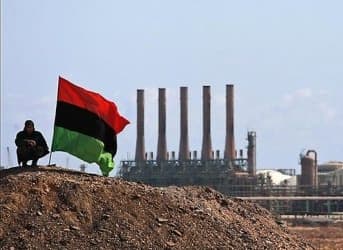Libyan Oil Minister Abdel Bari Ali al-Arousi said his country was ready to recover from civil war and take its rightful place as the powerhouse of North African energy producers. In its monthly report for May, OPEC said that Libya's economic recovery, despite lingering violence, was "exceptionally strong" with an 80 percent increase in gross domestic product year-on-year. Arousi told delegates at last week's offshore energy conference in Houston that his government was looking to bring investors back to a country that boasts more than 40 million barrels of oil reserves. Amid accusations that gunmen are now influencing decisions in Tripoli, international players may have an obligation to keep Libya from sinking once again.
Arousi told would-be investors last week that Libya is "well-poised to reclaim its place among the world’s largest oil producers." OPEC said Libya's booming economy helped with recovery among member states. Economic growth for OPEC members is expected to average 4.2 percent. For Libya, last year's 80 percent growth in GDP "distorted" the OPEC economic forecast, though growth for 2013 is still expected at around 15 percent. In terms of oil production, the oil cartel said that, fits and starts aside, oil production is up more than 200 percent from the civil war level to almost 1.4 million barrels per day.
Related article: North Dakota Oil Boom Set to Continue for Some Time
Economic growth in the Middle East and North Africa should weaken, however, despite the Libyan growth forecast. Outside of the region, OPEC said it saw improvements in the U.S. and Chinese economies, coupled with stabilization in the eurozone, to offset some of the other weaknesses seen globally. With this growth, OPEC said the global economy would need about 29.84 million bpd of its oil this year, an increase from the previous estimate.
Last week, the U.S. and British governments issued security alerts for Libya after armed gunmen occupied buildings housing the justice and foreign ministries. Friday, the British Foreign and Commonwealth office announced a decision to pull some non-essential staff out of the embassy in Tripoli because of the declining security situation. Acting on the government's advice, British energy company BP followed suit.
"Purely as a precautionary measure, we have brought non-essential overseas staff out of Libya for the time being in a phased reduction of numbers," BP said in a statement.
Italian energy company Eni expressed similar concern. CEO Paolo Scaroni told shareholders last week it was "almost a miracle" that Libyans managed to hold democratic elections in the first place.
Related article: A Company that Stands to do Well from the Collapsing WTI-Brent Spread
Both companies were among the first to resume operations in Libya as it became evident that Moammar Gadhafi's regime was about to collapse near the end of 2011. Before the war, questions were raised about BP's role in negotiations with the Gadhafi regime over the fate of Lockerbie bomber Abdel Basset Ali al-Megrahi. With the dictatorship gone, concern over the durability of Libya's post-war gains seems focused more on diplomatic safety than reconstruction. In the United States at least, some of the debate over Libyan security seems aimed at making sure Hillary Clinton's chances in 2016 are derailed.
Libyan energy security was such that the pending collapse of the regime in 2011 prompted the U.S. Energy Department to release 30 million barrels of oil from the Strategic Petroleum Reserve. Three years later and much of the Libyan debate in the United States now seems focused on partisan manoeuvring at home. Arousi told U.S. investors last week that his country was looking to strengthen bilateral ties in the energy field. Given the shift in attention from the international community, he may as well have been speaking to an empty room.
ADVERTISEMENT
By. Daniel J. Graeber of Oilprice.com


















